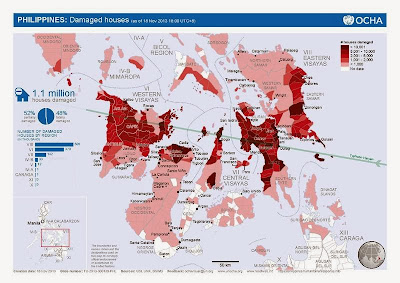U.S. gov't introduces immigration relief measures to Filipinos affected by typhoon Haiyan
 |
| Red zones show most of the damaged houses. Photo: wikipedia |
In a press release posted on its website on November 15, 2013, the U.S. Citizenship and Immigration Services had reminded Filipinos nationals that they can avail of these immigration relief measures if requested.
According to the USCIS, a natural disaster can affect an individual's ability to establish or maintain lawful immigration status in the United States, considering that Filipinos impacted by super typhoon Haiyan may be eligible to benefit from the following relief measures:
a) change or extension of non-immigrant status for an individual currently in the United States, even when the request is filed after the authorized period of admission has expired; b) extension of certain grants of parole made by USCIS; c) extension of certain grants of advance parole, and expedited processing of advance parole requests; d) expedited adjudication and approval, where possible, of requests for off-campus employment authorization for F-1 students experiencing severe economic hardship; e) expedited processing of immigrant petitions for immediate relatives of U.S. citizens and lawful permanent residents (LPRs); and
f) expedited adjudication of employment authorization applications, where appropriate; and g) assistance to LPRs stranded overseas without immigration or travel documents, such as Permanent Resident Cards (Green Cards). USCIS and the Department of State will coordinate on these matters when the LPR is stranded in a place that has no local USCIS office.
If applicable, all the applicants have to do is to fill up I-539, a form that is used to extend or change non-immigrant status. They also have to pay the corresponding fees upon filing of the form with the USCIS.
For more information on USCIS humanitarian programs, visit www.uscis.gov or call the National Customer Service Center at 1-800-375-5283.


Comments